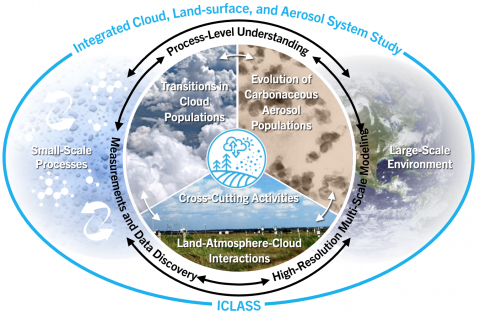Description
The long term goal of this scientific focus area (SFA) is to transform our understanding of climate-relevant processes and provide more robust model representations of the climate system through the integration of new knowledge on cloud and aerosol populations, and their interactions with each other and the Earth’s surface. Earth system models, high-resolution models, and observations are key tools for improving our understanding of the natural and human-influenced atmospheric processes affecting Earth’s climate. Despite recent scientific advances, models still contain biases arising from knowledge gaps and imperfect parameterizations of important physical and chemical atmospheric processes. Our research focuses on challenges associated with three broad categories of atmospheric processes including 1) land-atmosphere coupling, 2) the lifecycle of cloud populations, and 3) the lifecycle of aerosol populations. Since these processes are inherently interconnected over multiple spatial and temporal scales, they are addressed in an integrated way to advance process-level understanding and model parameterizations.
This SFA leverages a wide range of atmospheric measurements collected by DOE’s Atmospheric Radiation Measurement (ARM) and Environmental Molecular Science Laboratory user facilities. Our measurements-to-modeling approach synthesizes ARM/EMSL measurements, laboratory experiments, multi-scale numerical simulations, and parameterization development, to advance the fundamental understanding of atmospheric processes relevant to climate.

